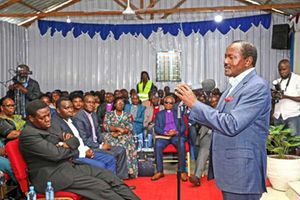Diversity key to building prosperous workplaces

The renewed focus on gender diversity has been another major trend. PHOTO | FILE | NATION MEDIA GROUP
What you need to know:
- Building a more inclusive workplace is going to be fundamental and diversity and inclusion are paramount in this.
- Today’s leaders must, therefore, be good communicators, have strong work ethics and be visionary and emotionally intelligent.
As we wrap up the year, expect the workplace to transform even more, building on the gains of the past decade to transform the work ecosystem.
Because of automation and emerging technologies like artificial intelligence and cloud computing, we are scaling heights and reaching new frontiers at the workplace.
It is increasingly easy to collaborate and work remotely, exponentially increasing productivity and efficiency.
Technological advancements have significantly reshaped our workplaces, making processes more streamlined and integrated.
Besides, the renewed focus on gender diversity has been another major trend.
The proportion of women on the boards of the listed companies continues to improve and has almost doubled since 2012.
Women account for over 23 per cent of board members, a report by gender equality data and insights provider Equileap and the Nairobi Securities Exchange (NSE) shows.
MENTAL HEALTH
The CEOs of seven of the 61 NSE-listed companies are women, demonstrating progress in the drive to diversity, especially at the executive and the C-suite levels.
Diversity is imperative to workplaces and efforts must be doubled to diminish the gender divide.
Efforts to bring mental health to the fore also received a boost in 2019.
Various organisations are reportedly introducing mental wellness programmes among employees. This, however, is a work in progress.
With studies showing an increased prevalence of mental illnesses such as stress, anxiety, and depression among workers, to which work has contributed, organisations must put mental health higher up in their priority list for 2020 and beyond.
Making the work environment family-friendly was, arguably, the most caring initiative in the workplace this year.
Lactation rooms and adequate break time for female employees resuming work after maternity leave has offered great emotional and psychological support as they transition back to work.
YOUNG GENERATION
The proposed Breastfeeding Mothers Bill 2019 and the Better Business Practice for Children initiative by the Kenya Private Sector Alliance will mainstream the conversation about a better work environment for nursing mothers and babies.
Building a more inclusive workplace is going to be fundamental and diversity and inclusion are paramount in this.
Closely tied to this will be the need to upskill the workforce to ensure they stay on top of new best practices and be future-ready.
Employers will have to revamp the learning and development programmes and match the training goals to align with the organisational objectives and employees’ defined career paths.
In the past decade, millennials — Generation Y — became the most populous generation in the workforce.
We have enjoyed seeing the world through their view and, while this may elicit debate, they brought values and dynamism into the workplace.
And now, Generation Z has come of age and is joining the workforce.
COMMUNICATION
We must be prepared to embrace this digitally savvy, socially conscious and largely mysterious generation.
Employers need to get ahead of the shift that this group represents and effectively and quickly master how to harness their potential for the success of the business and the economy.
Anchored in all these is the ability to lead a diverse workforce.
Today’s leaders must, therefore, be good communicators, have strong work ethics and be visionary and emotionally intelligent.
Ideally, soft skills are the new hard skills and the workplace is fraught for individuals with the right mix of soft skills.
As witnessed in the past few years, people want to work for organisations that are making a difference in the world.
SOCIAL STAND
Tomorrow’s companies must take a stand on social issues like climate change, renewable energy and equality among other social challenges.
They will not only have to locate the point where technology and human converge to close the skills gap but also demonstrate commitment to relevant social good programmes.
The next decade is promising.
Ms Ngala is the Head of Human Resources at Diamond Trust Bank. [email protected] @LillianNgala





